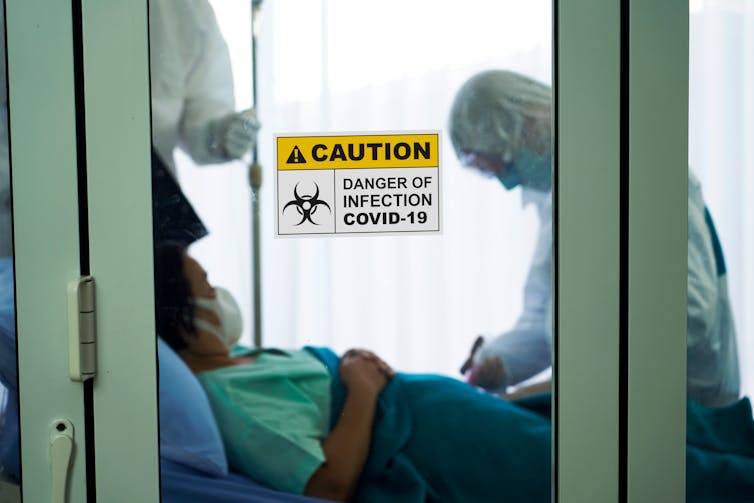Could taking hydroxychloroquine for coronavirus be more harmful than helpful?
- Written by Andrew McLachlan, Head of School and Dean of Pharmacy, University of Sydney
A paper published in The Lancet has cast fresh controversy on the use of the malaria drug hydroxychloroquine as a potential treatment for COVID-19.
The study’s authors reported they were “unable to confirm a benefit” of using the drug, while also finding COVID-19 patients in hospital treated with hydroxychloroquine were more likely to die or suffer life-threatening heart rhythm complications.
The publication prompted the World Health Organisation to suspend its testing of hydroxychloroquine to treat COVID-19, while a similar Australian trial has paused recruitment.
Read more: Donald Trump is taking hydroxychloroquine to ward off COVID-19. Is that wise?
A bit of background
Hydroxychloroquine has been used since the 1940s to treat malaria, but has been making headlines as a potential treatment for COVID-19. US President Donald Trump recently declared he was taking it daily, while Australian businessman and politician Clive Palmer pledged to create a national stockpile of the drug.
The drug alters the human immune system (it’s an immunomodulator, not an immunosuppressant) and has an important role in helping people with rheumatoid arthritis and lupus.
It does have a range of serious possible side-effects, including eye damage and altered heart rhythm, which require monitoring.
 We don’t know the patients in this study died because they took hydroxychloroquine.
Shutterstock
We don’t know the patients in this study died because they took hydroxychloroquine.
Shutterstock
Laboratory studies suggest hydroxychloroquine may disrupt replication of the SARS-CoV-2 virus that causes COVID-19. It’s also possible hydroxychloroquine could reduce “cytokine storm” – the catastrophic immune system overreaction that happens in some people with severe COVID-19.
A huge global effort is underway to investigate whether hydroxychloroquine is safe and effective for preventing or treating COVID-19, especially to improve recovery and reduce the risk of death. Previous studies have been inconclusive as they were anecdotal, observational or small randomised trials.
Doubts about hydroxychloroquine’s effectiveness have been increasing, with a large observational study from New York showing it had no benefit in treating people with COVID-19.
The new Lancet study, published last week, has found it could increase the risk of death among COVID-19 patients in hospital. But there’s more to the story.
What did the new study do?
The Lancet study collected real-world data on more than 96,000 hospitalised patients with COVID-19 from more than 600 hospitals across six continents.
About 15,000 patients were treated with hydroxychloroquine (or a closely related drug, chloroquine) alone or in combination with an antibiotic.
Using a global registry the researchers investigated the safety of these treatments. They looked at whether people died in hospital, as well as the risk of developing life-threatening heart rhythm problems (called ventricular arrhythmias).
What did the study find?
Treatment with hydroxychloroquine was associated with increased rates of death in people with COVID-19, even after the researchers adjusted for other factors (age, other health conditions, suppressed immune system, smoking, and severity of the COVID-19 infection) that might increase the risk of death.
About 18% of people who received hydroxychloroquine died in hospital, compared with 9% of people with COVID-19 who did not receive these treatments. The risk of death was even higher (24%) in people receiving hydroxychloroquine in combination with either of the antibiotics azithromycin or clarithromycin.
Hydroxychloroquine (6%) and chloroquine (4%) treatment was also associated with more cases of dangerous heart rhythm problems when compared with untreated people with COVID-19 (0.3%).
Any evidence of benefit, while not the focus of this study, was unclear.
Read more: Why are there so many drugs to kill bacteria, but so few to tackle viruses?
How can we interpret the results?
This was an observational study, so it can only explore the association between treatments and death – rather than telling us hydroxychloroquine caused these patients to die.
It is unclear why the death rate for patients treated with hydroxychloroquine and chloroquine was double that of those who weren’t, as the cause of death was not reported in this study.
Importantly, the study cannot account for all the factors that might contribute to death in these hospitalised patients and how these factors interact with each other. However, the researchers did a good job of “matching” the characteristics of people who were receiving hydroxychloroquine with those who were not receiving the drug, which makes the results more reliable.
But there may still be other factors, or medicines, that contributed to these findings. So there remains uncertainly about whether hydroxychloroquine causes, or even contributes to, the death of people with COVID-19.
 While the Lancet study has seen some hydroxychloroquine trials halted, others are continuing under careful monitoring.
Shutterstock
While the Lancet study has seen some hydroxychloroquine trials halted, others are continuing under careful monitoring.
Shutterstock
Further, it was not possible to have careful control over the hydroxychloroquine dose people received – or other medicines people might be taking such as antivirals or other medicines for heart conditions (which potentially interact in sick hospitalised patients).
The average dose of hydroxychloroquine in this study was at the upper end of the regular recommended dose range for rheumatoid arthritis and lupus. But the wide range of hydroxychloroquine (and chloroquine) doses in this study makes interpretation of the findings difficult, especially when we know harmful effects are associated with larger doses.
Broader implications
This study provides important information about the safety of hydroxychloroquine in treating vulnerable people with COVID-19 receiving hospital care.
While the implications for using hydroxychloroquine to treat COVID-19 in the community or for prevention of COVID-19 remain unclear, if nothing else this study highlights the need to carefully monitor people receiving the drug.
Some hydroxychloroquine trials are continuing, such as the very large RECOVERY trial in the UK.
This new information must be considered when balancing harm and potential benefit of these trials and will likely result in renewed safety monitoring.
Read more: Coronavirus: scientists promoting chloroquine and remdesivir are acting like sports rivals
We’ll need to see results from ongoing high-quality randomised controlled trials to truly know if hydroxychloroquine is effective and safe in treating or preventing COVID-19.
Further questions about what dose should be used, and which patients will benefit most, are topics under active investigation.
You should not take hydroxychloroquine for COVID-19 unless you’re part of a clinical trial. – Andrew McLachlan and Ric Day
Blind peer review
This is a fair and reasonable review of the Lancet paper, its relationship to previous studies, and its impact on ongoing clinical trials.
As stated in the review the Lancet article adds to the body of knowledge, including recent substantial studies in the New England Journal of Medicine and the British Medical Journal, that hydroxychloroquine is without significant effect in treatment trials.
The high death rate is concerning but not unprecedented, given that a clinical trial in Brazil was halted because of adverse effects on the heart. However, recent media reports suggest the data may have to be revised due to misclassification of the participating hospitals. – Ian Musgrave
Research Checks interrogate newly published studies and how they’re reported in the media. The analysis is undertaken by one or more academics not involved with the study, and reviewed by another, to make sure it’s accurate.
Authors: Andrew McLachlan, Head of School and Dean of Pharmacy, University of Sydney





